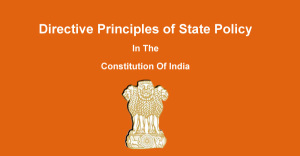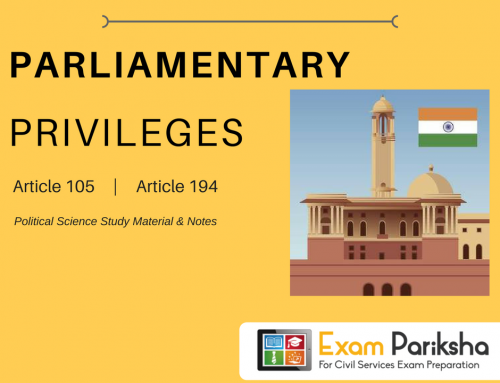Questions regarding Fundamental rights feature as a fixture in all General Awareness papers, especially UPSC exams like SSC, IAS, civil services, etc. these are also a staple in all the state PSC conducted exams. Here we are providing a brief material for quick revision as well as reference for benefit of fellow aspirants. These points will serve well for the Essay papers also.

Directive Principles of State Policy are instructions/guidelines to the governments at the center as well as states. Though these principles are non-justiciable, they are fundamental in the governance of the country.
The idea of Directive Principles of State Policy has been taken from the Irish Constitution.
They were incorporated in our Constitution in order to provide economic justice and to avoid concentration of wealth in the hands of a few people. Therefore, no government can afford to ignore these. They are, the directives to the future governments to incorporate the ideals in the decisions and policies to be formulated by them.These principles give directions to the state for making laws and policies for the collective good of the people.
The Directive Principles of State Policy are included in Part IV of the Constitution. The framers of the Constitution included them with a special purpose of bringing about social and economic equality.
These Principles are non justiciable and are not enforceable by the Courts of law. But they are still considered fundamental to the governance of country.
They are classified into four categories –
- Socio-economic principles
- Gandhian
- International peace and Security
- Miscellaneous
DPSPs put stress on universalization of education, abolition of child labour and improvement of the status of women. They give a framework for establishing welfare state and achieving economic and social democracy.
1. The economic and social Principles:
The state should strive to achieve Socio-economic welfare of the people by:
- providing proper means of livelihood for all citizens.
- reorganizing the economic system in such a way , in order to avoid concentration of wealth in few hands.
- securing equal pay for equal work for both men and women.
- securing suitable employment and healthy working conditions for men, women and children.
- protecting the children against exploitation and moral degradation.
- making provisions for securing the right to work, education and public assistance in case of unemployment, old age, sickness and disablement.
- making effective provisions for securing just and humane conditions of work and for maternity relief.
- taking steps to secure the participation of workers in the management of undertakings etc.
- promoting education and economic interests of working sections of the people, especially the SCs and STs.
- for all the workers, securing reasonable leisure and cultural opportunities.
- making efforts to raise the standard of living and public health.
- providing early childhood care and education to all children until they complete the age of 6 years.
2. The Gandhian Principles
These are certain principles, based on the ideals advocated by Mahatma Gandhi. These Principles are as follows : –
- To organize village Panchayats for self reliance.
- To promote cottage industries in rural areas.
- To prohibit intoxicating drinks and drugs that are injurious to physical and moral health.
- To preserve and improve the indeginous breeds of the cattle and prohibit slaughter of cows, calves and other milch and drought animals.
3. International Peace And Security related :
India should give active cooperation towards world peace and security.To achieve that, the state should endeavour for : –
- promoting international peace and security.
- maintaining just and honourable relations between nations.
- fostering respect for international laws and treaty obligations.
- encouraging settlements of international disputes by mutual agreement.
4. Miscellaneous:
The Directive Principles put under this call upon the state : –
- To secure for all Indians a uniform civil code.
- To protect historical monuments.
- To save environment from pollution and protect wild life.
- To make arrangements for disbursement of free legal justice through suitable
legislation.
Criticism of DPSPs:
Critics call these Directive Principles of State Policy as not better than‘New Year Greetings’ due to their irrationale, high sounding promises. It has been asserted that these Directives are in the form of holy wishes having no legal sanction behind them. No government is bound to implement them.
Critics also point out that they are not formulated keeping the practical aspect these ideals in mind.
In spite of the above stated criticism, it is widely agreed that -They have their own utility and significance.
These Directive Principles are like a polestar that provide direction. Their basic aim is to persuade the government to provide social and economic justice in all spheres of life, given the limited material resources available in the country, at the earliest possible. Many of them have also been implemented successfully.
Political cost: In reality, no government can afford to ignore these instructions as these are a reflection of the public opinion and also mirror the basic spirit of the Preamble of our Constitution.
Some of the steps taken by successive governments in this direction are summerised below:
- Land reforms have been introduced and Jagirdari and Zamindari systems have been abolished.
- There has been rapid industrialization and significant increase in the agricultural production through Green Revolution since independence.
- National Commission for the Welfare of Women has been established to look into issues of women.
- Ceiling has been placed on land and property to fix the limit of person’s holdings to ensure that wealth accumulation does not occur in hands of few individuals.
- The privy purses of ex-princes have been abolished.
- Life Insurance, General Insurance and most of the banks have been nationlised to provide access to these services to all citizens.
- In order to reduce economic disparity, Right to Property has been deleted from the chapter on Fundmental Rights.
- Subsidized public distribution schemes have been launched to help the poor citizens.
- The rules require that both men and women are paid equal wages for equal work.
- Untouchability has been abolished. Sincere efforts are constantly being made for the upliftment of the SCs ,STs and of other Backward Classes.
- Through 73rd and 74th Amendments to the constitution, (1991 & 1992 respectively), Panchayati Raj has been given the constitutional status with more powers to ensure effective decentralization.
- Small scale and village industries and Khadi Gram Udyog have been encouraged in order to bring prosperity to the rural areas.
- India has also been actively co-operating with the U.N. to promote international peace and security in the world.
These indicate that many Directive Principles of State Policy have been implemented to lay down the foundations of a secular, socialist and welfare state.
Even with these achievements, there is a long way to go towards total fulfillment. There are many roadblocks in full implementation of Directive Principles of State Policies:
- lack of political will on the part of the states;
- lack of awareness and organized action on the part of the people
- limited availability of material resources.
Difference between Fundamental Rights and Directive Principles:
The Fundamental Rights are claims of the citizens, merely recognized by the state. They are in the nature of denial of certain authority to the government. They are, therefore, negative in nature. Also, the Fundamental Rights are justiciable and are enforceable by the court of law. This implies that the Supreme Court and the High Courts have the powers to issue writs or orders for enforcement of Fundamental Rights.
The Directive Principles are like positive directions that the government at all levels must adhere to in order to contribute towards the establishment of social and economic democracy in India. Contaray to fundamental rights, the Directive Principles are non-justiciable which means these do not confer any legal rights and hence create no legal remedies.
Similarity between Fundamental Rights and Directive Principles
Inspite of the above differences, there is a close relationship between the two. Fundamental Rights and Directive Principles are complementary and supplementary to each other.
- On one hand, the Fundamental Rights establish political democracy, the Directive Principles establish economic and social democracy.
- No government can afford to ignore both of them while formulating its plans and policies as the government is responsible for all its actions to the people in general.
- Although there is no legal sanction behind DPSPs, the ultimate sanction lies with the people. The people with their opinion and empowered by their fundamental rights will never let the ruling party to acquire power again if it fails to follow these guiding principles.
- Thus, our Constitution aims at bringing about a synthesis between Fundamental Rights and Directive Principles of state policy.





